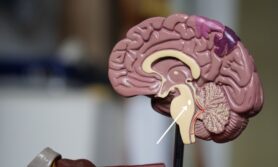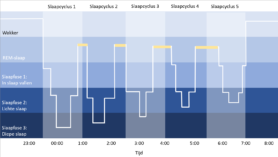Sleep
Your nightly adventures during the pandemic help you process all the corona stress
Have you noticed a difference in your dreams lately? You are not alone! Many people notice that their dreams are more vivid and last longer than usual when they were in lockdown due to the corona crisis. That may sound great, but many people actually dream about threatening situations more often. This affects how they feel during the day and how well they can carry out their daily activities such as work, housework, or caring for their children. With all the stress that comes with a changing environment due to a pandemic, your own dreams that are working against you is the last thing you can use. Dream researcher Matthew Walker provides an explanation and a solution for those bad dreams.
Dreams have to do with processing stressful events. This is according to research by Matthew Walker, a professor at the University of California. “Dreams are actually a form of overnight therapy,” he says. “They’re like a nocturnal calming balm that soothes the painful, sharp edges of difficult experiences.” For example, unpleasant emotions no longer sting after a night of sleep, and you can continue with the next day. But how exactly does that happen?
Dreams as overnight therapy
When you sleep, all kinds of changes take place in your brain. Some areas of the brain are ‘turned off’, whereas other areas are ‘turned on’. Research shows that the hippocampus is active when you dream, a seahorse-shaped brain region involved in memories that you store during the day. And the amygdala, an almond-shaped brain region involved in the generation and processing of emotions, is up to 30% more active during dreaming than when awake.
Other changes that take place in your brain during sleep are that the concentrations of various chemicals are raised or lowered. For example, during dreaming there is almost no noradrenaline left in your brain, a key stress molecule. And that is quite extraordinary, because there are never such low concentrations of noradrenaline at any other point during the day.
So, if you dream about a difficult event that you experienced during the day, you will get an overload of emotions, without the stress you had when you were awake. Your brain actually says to you, ‘Look, this unpleasant situation wasn’t that dangerous at all’. That way you can process the difficult event, and you can memorise that event without immediately getting stressed when recalling it.

While dreaming, you can hardly find the stress molecule noradrenaline in the brain. The arrow in the photo shows the nucleus in the brain where noradrenaline is produced. (Photo by Rubina Weermeijer on Unsplash.)
Vivid dreams during the lockdown
The processing of stress during sleep explains why people started dreaming differently during the height of the corona crisis in their country. Professor Walker is not surprised: “No wonder when we are more anxious and when we go through such an incredibly traumatic period as a pandemic, we dream more. The brain tries to give itself the healing it needs, which is emotional therapy.” Dream scientists have therefore mapped out which factors give us the most stress during the pandemic. Think of situations such as getting sick yourself, or the loss of a loved one to corona. But you also get stressed if you are merely very afraid of getting sick or making others sick. Furthermore, social isolation is very stressful for people, so during lockdown your noradrenaline levels will certainly shoot up. Finally, the daily habits of many people change during lockdown, such as working, eating or exercising more or less. All of this can make people feel more stressed. And it turns out, people who are experiencing the most stress because of the pandemic are also the people who notice the biggest changes in their dreams.
Less nightmares, more sweet dreams
Although dreams about stressful situations seem to play a positive role in processing all this stress, bad dreams remain unpleasant. People who have had a bad dream or nightmare often report that when they wake up, they feel that the whole night’s sleep was of poor quality. People who have had bad dreams also become more irritated and feel restless or gloomy during the day. If people have nightmares almost every night, they may even become afraid to go to sleep at night. In short, no fun. How can you reduce the chance of having a bad dream or nightmare?
When sleeping, you go through four different phases. It takes about an hour and a half to go through the phases one by one. So, during a regular night’s sleep you go through those phases all about five times. But it differs how long the phases last relative to each other as the night progresses. The phase in which you have the most vivid dreams is called the REM phase. REM sleep is named after the rapid eye movements you unconsciously make during that sleep phase. The more often you go through the entire sleep cycle, the longer the REM phase lasts and the shorter the other phases. If the REM phase lasts longer, you are more likely to have a nightmare, and you will remember your dreams better. The advice is therefore to get enough sleep (about 7 to 9 hours), but not too long.

Here you see an example of going through the sleep phases throughout the night. The beginning of the night is mainly spent in deep sleep (dark blue), but as the night progresses you spend more and more time in REM sleep (the yellow blocks). (Illustration created by the author of this article.)
In addition, it is best to try to find ways to deal with the stress. For example, studies during the corona crisis showed that the amount of news you follow about corona is related to the changes people experience in their dream behaviour. If you suffer from bad dreams, you can try to look up less news for a while. According to other studies, it can also help to write down the dreams in order to better process events during the day. “Find something that works for you and stick to it,” Walker recommends.
In short, if you’ve noticed a change in your dreams, it’s probably because of a change in your stress level. In any case, try to get enough (but not too much) sleep and to deal with your stress consciously. And maybe we should try to be grateful for those vivid dreams after all. This way we at least stay sane during such a stressful time.
Written by Dominique Blokland
Do you suffer from nightmares or gloomy feelings very often or for a long time, and do you want help to deal with them? Then contact your general practitioner. They can refer you to a suitable healthcare provider.
This article has been translated by Google Translate.
References
Gorgoni, M., Scarpelli, S., Alfonsi, V., Annarumma, L., Cordone, S., Stravolo, S. & De Genarro, (2021). Pandemic dreams: quantitative and qualitative features of the oneiric activity during the lockdown due to COVID-19 in Italy. Sleep Medicine, 81, 20-32.
Guo, H. & Shen, H. (2021). Media exposure to COVID-19 epidemic and threatening dream frequency: A moderated mediation model of anxiety and coping efficacy. Dreaming, 31(1), 1–19.
Hobson, J.A. (2005). Dreaming: A very short introduction. Oxford University Press.
Iorio, I., Sommantico, M. & Parrello, S. (2020). Dreaming in the time of COVID-19: A quali-quantitative Italian study. Dreaming, 30(3), 199-215.
Kandel, E.R., Schwartz, J.H., Jessell, T.M., Siegelbaum, J.A. & Hudspeth A.J. (2013). The principles of neural science (5th ed.). The McGraw-Hill Companies, Inc.
Sommantico, M., Iorio, I., Lacatena, M. & Parrello, S. (2021). Dreaming during the COVID-19 lockdown: a comparison of Italian adolescents and adults. Research in Psychotherapy: Psychopathology, 24, 212-223.
Shredl, M. & Bulkeley, K. (2020). Dreaming and the COVID-19 pandemic: A survey in a U.S. sample. Dreaming, 30(3), 189-198.
Talks at Google. (2021, May 28). Matthew Walker | Sleep in Uncertain Times | Talks at Google [Video]. YouTube.
Tech Insider. (2018, February 7). What Happens To Your Brain When You Dream [Video]. YouTube.
Walker, M. (2017). Why we sleep. Penguin Random House.

